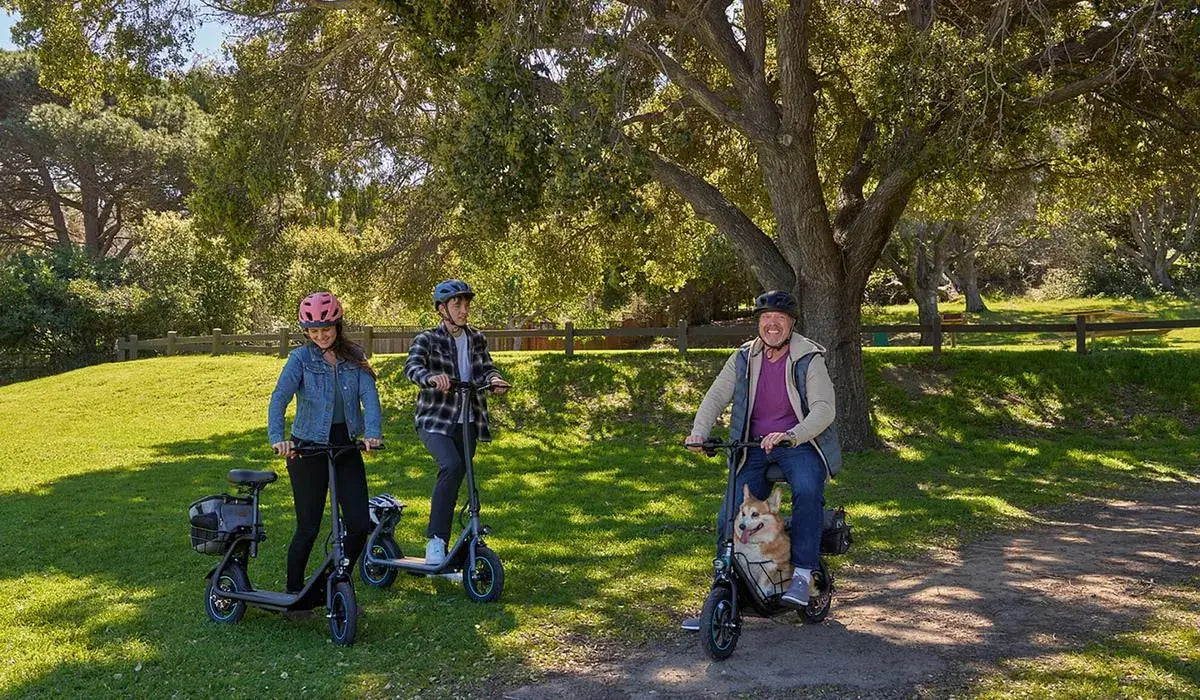Electric scooters typically range from $200 to over $2,500, but this seemingly simple range actually covers a wide range of models, configurations, and uses. Entry-level electric scooters are usually priced between $200 and $400, while mid-range products are mostly concentrated in the $400-$800 range with significantly improved features. High-end electric scooters often cost more than $1,000-$2,500+.
Why Does the Price of an Electric Scooter Vary So Much
If you're asking how much does a electric scooter cost, you'll notice price differences are not just about brand recognition—they reflect major disparities in engineering, comfort, and performance.Battery Capacity & Range
The battery is one of the most expensive components in an electric scooter. Range can vary from 10 miles to over 60 miles, and it directly impacts the overall price. A longer range usually indicates a larger battery capacity, which means more battery cells, thicker electrode materials, and higher energy density — all of which increase manufacturing costs.
Moreover, the larger the battery capacity, the more advanced the Battery Management System needs to be. It must:
Precisely control the voltage, current, and temperature of each cell group
Prevent risks like overcharging, over-discharging, and short-circuiting
Extend cycle life and ensure long-term safety
This involves not only electronic control, but also heat dissipation design, shock-resistant housing— all of which add further cost.
Frame Design & Comfort
Price differences are also influenced by frame construction and ride comfort. More expensive models often feature:
Frame Materials: Scooters built with aluminum alloy or carbon fiber are much lighter and more durable than those made from standard steel. However, these premium materials are also more expensive to source and process, which drives up production costs.
Tires & Suspension: Large pneumatic tires combined with suspension systems can effectively absorb road vibrations, making them ideal for rough or uneven surfaces. These systems require additional parts, assembly, and precision engineering—making them costlier. In contrast, solid tires without suspension are cheaper but only suitable for flat, smooth urban roads.
Seat Design: Scooters equipped with adjustable, padded ergonomic seats provide enhanced comfort for longer rides. This adds complexity in structure, increases material use, and may require a reinforced frame to support seated riding, all of which increase cost.
Motor Power
Higher power doesn't just mean faster scooters; it also means greater torque, improved hill climbing, and increased load capacity, which also translates to higher engineering costs. A "stronger" motor requires thicker copper wire coils to transmit higher currents and stronger magnets to generate greater rotational force. These raw materials are core cost components.
For example, a 250W motor can typically only power a lightly loaded scooter on flat roads, with limited hill climbing capability. Meanwhile, an 800W–1000W motor can typically start stably on slopes steeper than 15° and can carry loads exceeding 120kg at high speeds. This performance leap is driven by comprehensive cost investments, from materials to control systems, and directly contributes to one of the core price differences of electric scooters.
How to Choose an Electric Scooter Within Your Budget
When deciding how much an electric scooter costs makes sense for you, the key is matching features to your actual use case. Do you need something portable, long-range, hill-capable, or cargo-friendly?
If Your Budget is $200–$500:
You can consider entry-level electric scooters designed for short-distance commuting or casual rides around campuses and neighborhoods. In this price range, you’ll typically find scooters with 250W–350W motors, offering top speeds of around 15.5 mph. Battery capacity is usually provide a range of 10–15 miles per charge. These scooters often weigh between 25–35 lbs, making them lightweight and portable. They’re ideal for riders who prioritize affordability and convenience over speed or hill-climbing performance.
The Gyroor X2 Electric Scooter is a strong contender at $379.90. It features:
-
550W (peak 800W) brushless motor
-
Top speed of 18.5 mph
-
Range up to 20 miles
-
12-inch pneumatic tires
-
Front and rear disc brakes
-
UL2272 safety certification
-
Foldable design with a large front basket
-
Load capacity of 265 lbs
Perfect for commuting, students, or local errands with a balance of performance and portability.
If Your Budget is $500+:
If your budget is over $500, you can explore mid-range to high-performance electric scooters. Scooters in this range often feature 500W–1000W motors, enabling top speeds of 18–28 mph and improved hill-climbing ability. Battery capacities in this range typically support longer rides of 20–40 miles per charge. You’ll also find larger pneumatic tires (10–14 inches), all of which enhance ride comfort and road adaptability.
The Gyroor C1Plus electric scooter, with its more powerful, larger payload, and more comprehensive features, will be your ideal choice for advanced commuting and multi-purpose travel. It's currently priced at $599.99. It includes:
-
650W (peak 1000W) motor
-
30-mile max range
-
18.6 mph top speed
-
14-inch air tires with dual suspension
-
300 lbs max load capacity
-
Dual removable cargo baskets
-
Wide 11.8-inch deck for feet or small pets
-
Adjustable seat and handlebars
Ideal for advanced commuting, grocery runs, or carrying pets and gear.
Hidden Costs of Owning an Electric Scooter
How much for electric scooter ownership long-term? There are real costs beyond the initial price. Here’s what to consider:
Battery Replacement
Lithium batteries typically degrade after 500–800 charge cycles. Replacing a battery can cost between $100–$300, depending on the capacity.
Safety Gear & Accessories
Depending on state laws and safe riding practices, you may need:
Helmet, gloves, lights, reflective gear Estimated cost: $50–$150
Anti-Theft Protection
Electric scooters are often theft targets. You may want:
High-strength U-lock
GPS tracker or alarm Estimated cost: $80–$200
How Much Should You Really Spend
If your scooter costs $500, your total spend might end up closer to $700, once you factor in all the essentials. So when planning your purchase, don't just ask "What can I afford?" — ask "What will it actually cost to own and use it safely?"

Share:
Can You Get a DUI on an Electric Scooter?